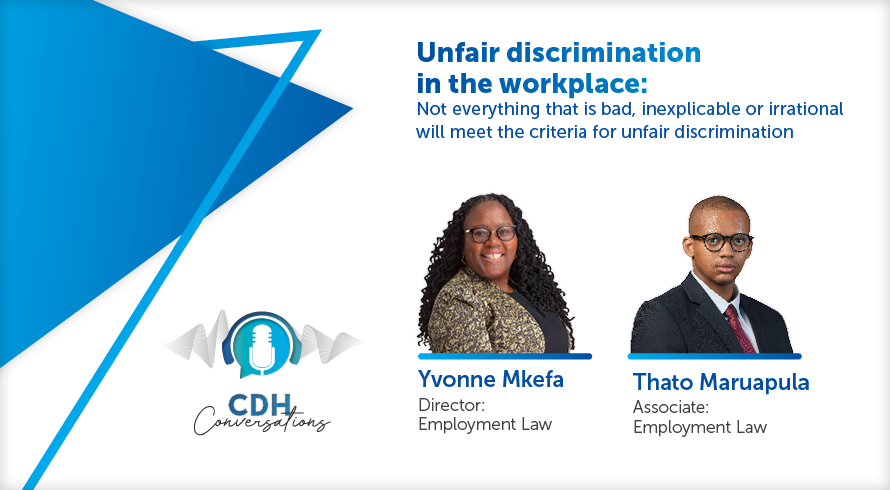Good riddance to ‘gag orders’? South African courts move away from prior restraint orders
At a glance
- Prior restraint interdicts, or ‘gag orders’, involve the review and restriction of speech or publications before their release. Several jurisdictions, including South Africa, are moving away from this form of censorship and have developed a rule for considering prior restraint applications.
- The law against prior restraint in South Africa holds that there should be no final interdicts preventing publication, unless a court is satisfied that the applicant is likely to establish that the publication of a defamatory item should not be allowed; and, even then, only if the court is satisfied that the disadvantage of curtailing the free flow of information to the public is outweighed by the advantage of the applicant curtailing the information.
- Other mechanisms a defamed person or entity could rely on to have an unlawful publication taken down are regulated by the Electronic Communications and Transactions Act 25 of 2002, the Press Code, the Broadcasting Complaints Commission of South Africa's Codes of Conduct, and the Financial Advisory and Intermediary Services Act 37 of 2002.
One form of press freedom restriction is by way of prior restraint in the form of an application for a final interdict against a proposed publisher. Commonly known as ‘gag orders’, prior restraint interdicts involve the review and restriction of speech or publications before their release. Several jurisdictions, including South Africa, are moving away from this form of censorship and have developed a rule for considering prior restraint applications. This rule provides that the courts will not restrain the publication of speech when the media intends to defend such a publication, unless the applicant can show that the publication should be restricted based on a demonstrable and substantial risk of prejudice that might occur, and it is in fact unlawful. The applicant must meet the requirements for a final interdict before the publication is released, establishing:
- a clear right;
- that there is an injury actually committed or reasonably apprehended; and
- the lack of an adequate alternative remedy.
The requirements for ‘gag orders’ in South Africa
This rule against prior restraint was confirmed by the Supreme Court of Appeal in Midi Television (Pty) Ltd v Director of Public Prosecutions [2007] (9) BCLR 958 (SCA). Although the case concerned the extent to which freedom of expression may be limited in favour of preserving the integrity of the administration of justice, the court also remarked that where it is alleged that a publication is defamatory, but it has yet to be established that the defamation is unlawful, an award of damages is usually capable of vindicating the right to reputation if it is later found to have been infringed. Therefore, providing an alternative remedy which means an anticipatory ban will seldom be necessary. Thus, the law against prior restraint in South Africa holds that there should be no final interdicts preventing publication, unless the court is satisfied that the applicant is likely to establish that the publication of a defamatory item should not be allowed; and, even then, only if the court is satisfied that the disadvantage of curtailing the free flow of information to the public is outweighed by the advantage of the applicant curtailing the information.
What is clear from the above is that the courts are reluctant to interdict publications due to the effect that this would have on the freedom of expression and press freedom. Accordingly, unless an applicant meets the high requirement of clearly showing that the publication contains a palpable untruth, before the actual publication thereof, they will instead be limited to a defamation claim after the fact. Does this mean that the publication, which wasn’t subject to a prior restraint interdict, will remain public until such a time that the plaintiff is able to successfully prove defamation in a court of law? Luckily not. There are various other mechanisms a defamed person or entity could rely on to have an unlawful publication taken down. These mechanisms are regulated by the Electronic Communications and Transactions Act 25 of 2002 (ECTA), the Press Code, the Broadcasting Complaints Commission of South Africa’s Codes of Conduct (BCCSA Codes), and the Financial Advisory and Intermediary Services Act 37 of 2002 (FAISA).
The Electronic Communications and Transactions Act
In terms of the ECTA, a complainant may address a notification of unlawful activity to the Internet Service Providers’ Association setting out, inter alia, the details of the complainant, identification of the right that has allegedly been infringed, identification of the material or activity that is claimed to be the subject of unlawful activity, the remedial action required to be taken by the service provider in respect of the complaint, and a statement that the complainant is acting in good faith. The Internet Service Providers’ Association will then forward the complaint to the internet service provider who is hosting the alleged unlawful content. Thereafter, the internet service provider will issue a take-down notice to the owner of the content, providing them with a reasonable period in which to take the content down.
Where the owner objects to the content being taken down, the internet service provider will investigate the complaint and alleged unlawful content. After considering the various rights at play, the potential damage to the owner of the content should the content be taken down, and press freedom, the internet service provider will decide whether to remove the content or to dismiss the complaint. It should be noted that where the service provider finds that the complainant lodged the complaint knowing that they materially misrepresented the facts, they will be held liable for damages for wrongful take-down.
The Press Code
The Press Code, which was formulated by the Press Council of South Africa, clearly provides that the media shall present only what may reasonably be true as fact, and any opinions, assumptions or suppositions must be presented clearly as such. The media is also obliged to exercise care and consideration in matters involving dignity and reputation. This may be overridden where, inter alia, it is in the public interest, where it amounts to public comment, or where the facts are true or substantially true. In this regard, the code further provides that the media shall not be obliged to remove any article which is not unlawfully defamatory.
Where a complainant feels that a publication has contravened the Press Code, they can submit a complaint to the Press Council. Upon formal acceptance of a complaint by a public advocate they will immediately notify the author/owner of the alleged contravening publication of the complaint in writing, giving sufficient details to enable them to investigate the matter and respond within seven working days. The public advocate will thereafter engage with the parties to try and achieve a speedy settlement. However, if the complaint is not settled within 15 working days, the public advocate will refer the complaint to the Press Ombudsman for adjudication.
The ombudsman will either decide the matter on the papers, convene an informal hearing with the two parties, or convene an adjudication panel to adjudicate the matter with them at the formal hearing. Where the ombudsman finds that the publication has contravened the Press Code, they may caution or reprimand the publication, or direct the correction or retraction of the publication.
The BCCSA Codes
The BCCSA has a Free to Air Code of Conduct, a Subscription Code of Conduct, and an Online Code of Conduct. These codes regulate members of the National Association of Broadcasters who have signed the relevant codes of conduct applicable to their medium of broadcasting. Similar to what has been discussed above, the BCCSA Codes also contain provisions requiring the fair broadcasting of facts which are true or substantially true and the protection of an individual’s dignity and reputation.
Here, a complainant may file a complaint against the proprietor of the broadcasting station to the Registrar of the BCCSA. If the complaint is accepted, the Registrar forwards it to the broadcaster, which is then required to provide a copy of the programme to the Registrar, accompanied by its response to the complaint. The broadcaster’s comment is then forwarded to the complainant for a reply. If the complainant is satisfied with the response, the matter is closed. If the complainant does not accept the response, the matter is referred to an adjudicator who will assist the parties in achieving a speedy settlement on an informal basis. If the complaint is not settled within seven days, the adjudicator will give their decision as to the resolution of the dispute. This decision may be taken on appeal to a tribunal.
Both the adjudicator or the tribunal have the power to order rather hefty sanctions should they find that the broadcaster contravened the codes, such as a fine not exceeding R100,000, an order directing the broadcaster to broadcast a response by the complainant to the allegations found to be in breach of the relevant code, or an order directing a correction and/or a summary of the findings be broadcasted.
The Financial Advisory and Intermediary Services Act
Finally, it should be noted that FAISA gives the Registrar of the Financial Sector Conduct Authority the power to issue a notice to an authorised financial service provider ordering the provider not to publish, to cease publishing, or to effect any changes to any advertisement, brochure or similar document relating to the rendering of a financial service where the document is misleading, confusing, or contains any incorrect statement of fact. The notice will take effect after the Registrar has provided the person concerned with the reasons for the notice and afforded them a reasonable opportunity to be heard.
Conclusion
Freedom of speech is valued in our society, but no right is entirely absolute. While the courts are reluctant to restrain a publication prior to its release in circumstances where it is not shown that the publication is unlawful and the disadvantage of curtailing the free flow of information is outweighed by the advantage of the applicant curtailing the information, an aggrieved complainant will always have a claim for damages for unlawful defamation after the fact. However, it is widely recognised that these court proceedings would be lengthy and expensive. Fortunately, there are a variety of alternative mechanisms a defamed individual can employ when seeking the speedy and cost-efficient removal of a defamatory publication. However, these mechanisms do not provide the defamed individual compensation for the infringement of their dignity and/or reputation. This is an order that only a court can make
The information and material published on this website is provided for general purposes only and does not constitute legal advice. We make every effort to ensure that the content is updated regularly and to offer the most current and accurate information. Please consult one of our lawyers on any specific legal problem or matter. We accept no responsibility for any loss or damage, whether direct or consequential, which may arise from reliance on the information contained in these pages. Please refer to our full terms and conditions. Copyright © 2026 Cliffe Dekker Hofmeyr. All rights reserved. For permission to reproduce an article or publication, please contact us cliffedekkerhofmeyr@cdhlegal.com.
Subscribe
We support our clients’ strategic and operational needs by offering innovative, integrated and high quality thought leadership. To stay up to date on the latest legal developments that may potentially impact your business, subscribe to our alerts, seminar and webinar invitations.
Subscribe




